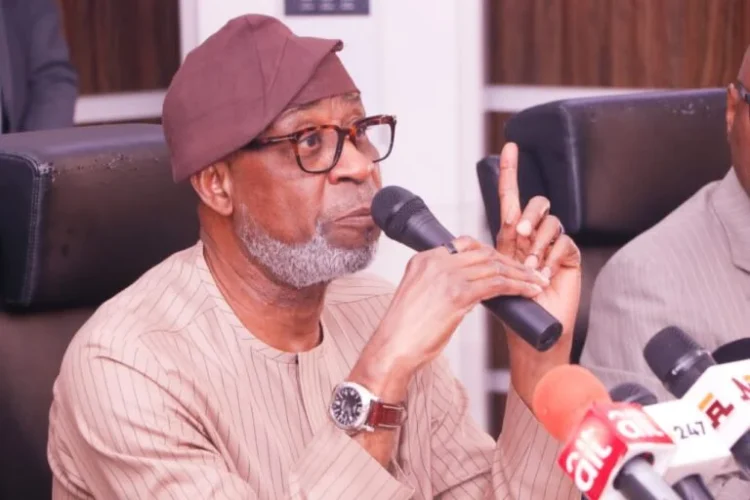Dele Alake, minister of solid minerals development, has said that Sule Lamido, the former governor of Jigawa, is experiencing memory issues.
Lamido had alleged on Saturday that President Bola Tinubu was in support of the annulment of the June 12, 1993 presidential election.
Responding during an interview on Arise Television on Sunday, Alake described Lamido’s account as “false, revisionist and historically dishonest”.
He emphasized that Tinubu played a pivotal role in the effort to validate MKO Abiola’s presidential mandate.
Alake said, “I feel very appalled at his own submissions, which I would ascribe largely to selective amnesia at best, or at the very worst, an impairment of the medulla oblongata — or memory loss in layman’s terms.”
He pointed out the irony of Lamido, then the national secretary of the Social Democratic Party (SDP), accusing Tinubu of betrayal despite the party leadership’s decision to “capitulate to the military”.
Alake, who was editor of Sunday Concord at the time, said he personally authored Abiola’s first public declaration to run for the 1993 election and is well-acquainted with the events of that era.
He noted that Tinubu remained deeply committed to the pro-democracy movement throughout the election and after, and that Tinubu was instrumental in convincing Atiku Abubakar to withdraw for Abiola during the SDP primaries.
He also refuted Lamido’s assertion that Tinubu’s mother, the late Abibatu Mogaji, supported the annulment, calling it “completely untrue”.
Alake explained that “Alhaja Abibat Mogaji was a very prominent and important market leader in Lagos who commanded large following among the women folk and market people in Lagos.”
He continued, “Obviously, there was no government pre-IBB that did not seek the endorsement or support of Alhaja Mogaji’s large movement in Lagos at the time. Now, Alhaja Mogaji, IBB also, as a government, as a leader, sought the support of the market women.”
He recounted, “However, on the annulment of June 12, I recall vividly that Alhaja Mogaji not only begged IBB, she came to Abuja to kneel down and weep before IBB.”
“It was to beg IBB to reverse the annulment, and we were all witnesses anyway to when she left and came back and gave the report. That was what happened.”
Alake added that Tinubu strongly condemned the annulment while serving as a senator and played a significant role in coordinating and funding mass protests against the move, up until Sani Abacha took control in November 1993.
“Tinubu was one of the organisers and funders of the July 1993 protests,” he said.
“He confronted the military head-on and eventually had to flee the country when Abacha’s regime declared him wanted — dead or alive.”
He accused Lamido and the late Tony Anenih of betraying Abiola’s mandate by endorsing the Interim National Government (ING) established by Ibrahim Babangida.
According to Alake, Tinubu continued to back the pro-democracy struggle while in exile, financially supporting the National Democratic Coalition (NADECO) and other resistance efforts.
He added that Tinubu even accompanied Abiola to meet with Abacha in an attempt to negotiate the restoration of the mandate, questioning the logic of claims that he was aligned with Abacha.
He said, “If Tinubu was loyal to Abacha, would he be confronting him? Why was there an arrest order on him?”
Bayo Onanuga, presidential spokesperson, also criticized Lamido’s remarks, suggesting that they were an effort to distort history for political advantage.
“Alhaji Lamido’s claims represent a distortion of history and a regrettable attempt at revisionism,” he said.
He affirmed that Tinubu’s role in the June 12 struggle is thoroughly documented.














